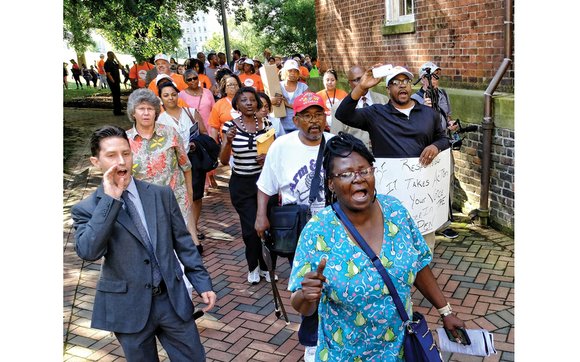Va. Supreme Court hears felon voting rights restoration case
7/22/2016, 12:25 p.m.

Did Democratic Gov. Terry McAuliffe have the power to issue a blanket order restoring the rights of more than 200,000 felons?
That’s the issue the Virginia Supreme Court is pondering after hearing arguments Tuesday in a lawsuit that some critics believe could have an impact on the November presidential election.
As the arguments went on inside, more than 100 people support- ing the governor’s order held a rally at the Bell Tower at Capitol Square and marched to the Supreme Court building nearby. Among the speakers were several felons whose rights have been restored. Participants in the rally, organized by a coalition of more than 20 organizations, also attended workshops on voter registration, protecting elections and redistricting reform.
The seven justices listened to arguments by lawyers from both sides, but did not say when they would decide the Republican lawsuit challenging the governor’s order.
GOP leaders have suggested that Gov. McAuliffe’s unprec- edented executive order on April 22 giving blanket restoration of rights to felons could increase the Democratic vote and help tip the vote in Virginia in favor of Hillary Clinton, his party’s presumptive presidential candidate.
A lawyer for leaders in the Republican-controlled General Assembly argued to the court that Gov. McAuliffe exceeded his authority by restoring voting rights en masse, rather than on a case-by-case basis.
“Never in Virginia’s 240-year history has a governor exercised clemency power en masse,” Charles Cooper told the justices, argu- ing that past practice and the language of the Virginia Constitution clearly indicate that the restoration of a felon’s voting rights must be done individually.
He also argued that allowing a mass of felons to vote would dilute the vote of non-felons in November, although state elections officials report that fewer than 12,000 have registered to date. “It is inherent in the right to vote, the right to cast a full vote,” he told the court.
Virginia Solicitor General Stuart Raphael, however, urged the justices to throw out the case, arguing that the GOP lawmakers lack legal standing to challenge the governor’s action because they cannot show they were personally harmed.
And just because no governor in Virginia history has used the power doesn’t mean it doesn’t exist, he told the court, saying, “If the Constitution provides the power, it doesn’t get lost from non-use.”
Gov. McAuliffe’s order restored the voting rights of every felon in Virginia who had completed his or her prison sentence and finished any supervised release, parole or probation as of April 22.
The plaintiffs have asked the court to block the governor’s action, which also allows felons to serve on juries, seek election to public office and be a notary public.
When the governor issued his initial order in April, the administration estimated about 206,000 people would qualify, a number that has grown with the governor’s issuance of at least one additional executive order restoring the rights of other felons who qualified after the first order.
If the Republicans win the suit, the state’s highest court would
prohibit election officials from further registering felons covered by the governor’s orders and could require cancellation of the registration of felons who already signed up to vote.
Gov. McAuliffe has said that should the plaintiffs win the suit, he would immediately restore the rights of felons with individual orders.
Virginia is one of four states whose constitutions permanently disenfranchise felons unless the governor uses the constitutional authority to restore voting rights, according to the Brennan Center for Justice, a nonpartisan civil liberties group.
Gov. McAuliffe and other Democrats have said the restoration of rights to felons who have served their sentences and completed probation is long overdue.
The McAuliffe administration, though, has refused to release the names of felons whose rights have been restored, promising to do so at the next session of the General Assembly when such a report is traditionally provided.
Such secrecy drew criticism on Tuesday from Justice Wil- liam Mims.
“I cannot understand why a document of such importance has been shielded from litigants and the citizens of Virginia,” he said.







